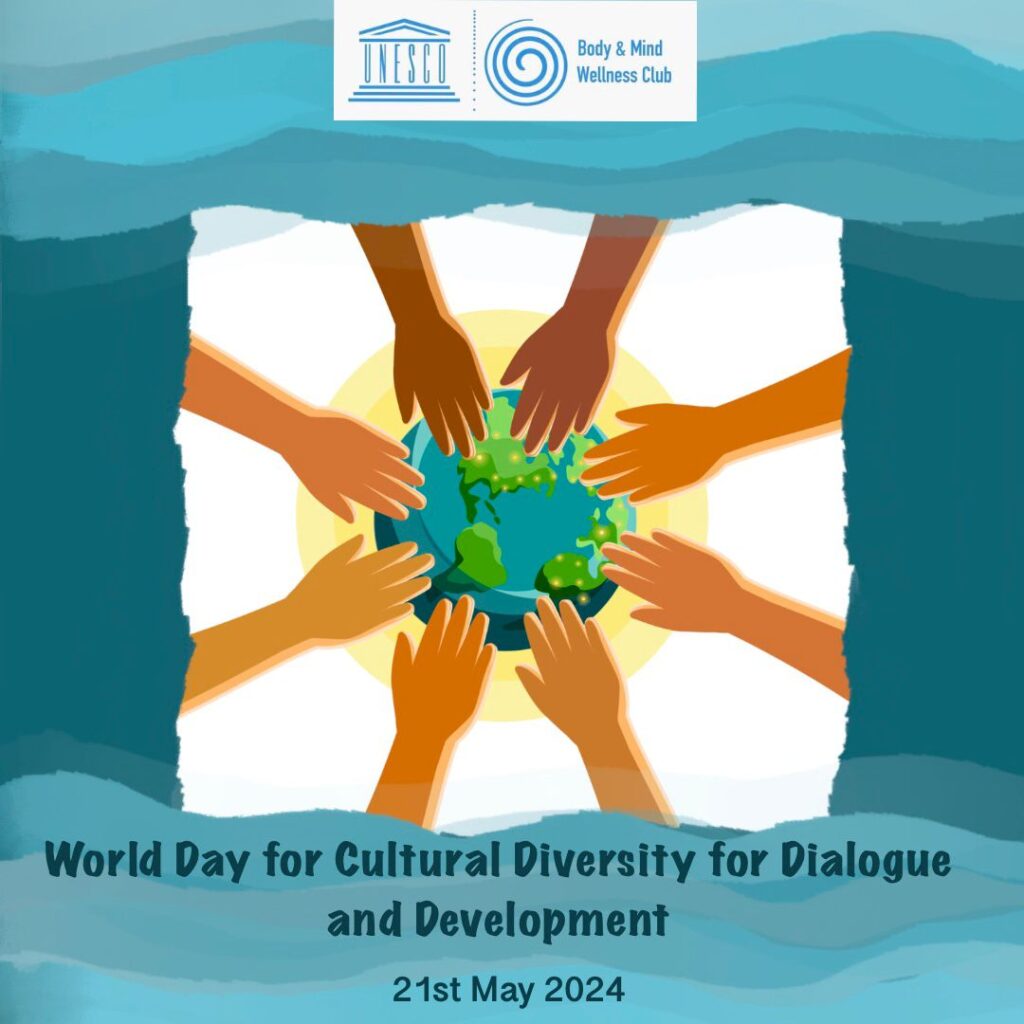
World Day for Cultural Diversity for Dialogue and Development
Annually observed on May 21, the World Day for Cultural Diversity for Dialogue and Development commemorates the diversity of global cultures and underscores the importance of intercultural dialogue for fostering peace and sustainable development. The United Nations General Assembly established this World Day in 2002, subsequent to UNESCO’s adoption of the Universal Declaration on Cultural Diversity in 2001. This recognition highlights the imperative of leveraging culture to promote prosperity, sustainable development, and harmonious global coexistence.
The Origin:
The origin of World Day for Cultural Diversity for Dialogue and Development lies in the recognition of the vital role of intercultural dialogue, interreligious dialogue, and the integration of culture into sustainable development. Initiated within the global framework of the Alliance of Civilizations by the United Nations, this day emphasizes equitable exchange and dialogue among civilizations, cultures, and peoples, fostering mutual understanding and respect for cultural diversity. UNESCO’s Interreligious Dialogue program complements this by promoting understanding among different religions and traditions and countering conflicts associated with religious belonging. Furthermore, placing culture at the heart of development policy is seen as essential for successful globalization processes and sustainable development, with the aim of integrating cultural diversity principles into all public policies and practices. By acknowledging culture’s intrinsic connection to identity and societal cohesion, the World Day for Cultural Diversity for Dialogue and Development underscores the imperative of embracing cultural pluralism for global peace and prosperity.
Importance and Impact:
Held annually on May 21 under the leadership of UNESCO, the World Day for Cultural Diversity for Dialogue and Development serves as a platform to celebrate the vast richness of global cultures while emphasizing the critical role of intercultural dialogue in fostering peace and sustainable development. Current statistics reveal a stark reality, with 89% of global conflicts unfolding in regions characterized by low levels of intercultural dialogue, underscoring the urgent need to prioritize and strengthen this dialogue for effective cooperation and the maintenance of peace. The cultural and creative sector emerges as a significant driver of global development, generating over 48 million jobs worldwide, nearly half of which are occupied by women. This sector contributes 6.2% to global employment and 3.1% to global GDP, while offering substantial opportunities to the youth demographic, with a majority under the age of 30 finding employment within it. Despite its economic and social contributions, the cultural and creative sector remains underrepresented in public policies and international cooperation frameworks.
Cultural diversity, recognized as a catalyst for development, not only fuels economic progress but also enriches human life intellectually, emotionally, morally, and spiritually. This principle is embedded within cultural conventions that promote and protect cultural diversity as an indispensable asset for poverty reduction and sustainable development. Furthermore, embracing and acknowledging cultural diversity, facilitated by innovative media and ICT usage, fosters dialogue, mutual respect, and understanding among civilizations and cultures, thereby contributing to global peace and stability.
UNESCO BMW’s Involvement
UNESCO BMW plays a significant role in celebrating World Day for Cultural Diversity by organizing various events and programs that resonate with the essence of this special day. These initiatives promote empathy and cultural understanding among young minds.
UNESCO BMW’s Vision
Our vision mission encompasses three main goals that are also in line with this occasion today and engage people of all ages, especially the youth improvement of the inner ecosystem, enhancement of inner creativity through arts and crafts, and, lastly, encouragement of inner peace globally.
By: Labiba and Muskan
(Muskan Imran)
(Labiba Tahia)
Sources :
- UNESCO BMW. (n.d.). Our mission. https://unescobmw.org/about-us/our-mission/
- United Nations. (n.d.). Background. World Day for Cultural Diversity for Dialogue and Development. https://www.un.org/en/observances/cultural-diversity-day/background
- United Nations. (n.d.). Cultural Diversity Day. https://www.un.org/en/observances/cultural-diversity-day
- . UNESCO. (n.d.). Universal Declaration on Cultural Diversity. https://www.unesco.org/en/legal-affairs/unesco-universal-declaration-cultural-diversity
- United Nations. (n.d.). Videos. World Day for Cultural Diversity for Dialogue and Development. https://www.youtube.com/watch?v=_9wOh1AZqfo
. United Nations. (n.d.). Videos. World Day for Cultural Diversity for Dialogue and Development. https://www.youtube.com/watch?v=RqE8mLVnVlg
